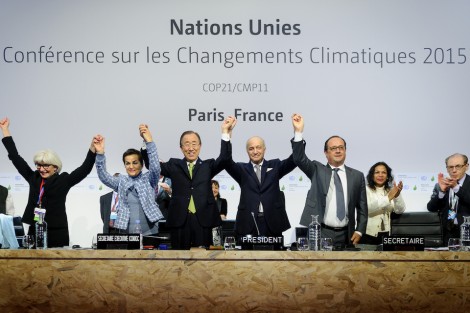[dropcap]E[/dropcap]xtreme temperatures, natural disasters, air pollution, the spread and emergence of infectious diseases, food insecurity — these are just some of the ways that climate change can impact our health. In fact, these concerns are so pressing that the World Health Organization named climate change the greatest public health threat of the twenty-first century.
Against the backdrop of the 2015 Paris Climate Conference (COP21), it is important to consider the role of universities in taking action against climate change.
At the Dalla Lana School of Public Health (DLSPH), our vision is “[a] world in which every person and community… can have the same opportunities to live a long and healthy life, as part of a sustainable planet.” As public health professionals, we are required to advocate for health, and especially against health inequities.
Unsurprisingly, then, DLSPH recently signed on to a statement of commitment, which was spearheaded by the White House, to ensure that the next generation of health professionals are trained to tackle the health challenges posed by climate change. We joined more than 70 other health faculties in the United States and Canada in signing onto this commitment.
Additionally, the DLSPH recently joined the U of T community, led by Toronto350, in submitting a statement of support for fossil fuel divestment to the Presidential Advisors Committee on Divestment from Fossil Fuels. DLSPH called for action in light of the “the dangers that climate change poses to health and the need for climate change mitigation to protect our livelihoods.”
Over the December break, the committee released a report acknowledging that there are fossil fuel companies that “engage in egregious behaviour and contribute inordinately to social injury.” The committee recommends that the university set up a method to evaluate which companies fall into that category. If we as a university community are indeed committed to protecting our climate, and consequently our health, then it is imperative that president Gertler accept these recommendations.
Despite ongoing research, education, and advocacy, we must recognize the urgency of the climate issue and the need to continue efforts to combat it. Complex problems require complex solutions; collaboration across faculties and disciplines is necessary to come up with innovative strategies that can collectively tackle climate change. While adaptation to and mitigation of climate change are touted as the greatest global health opportunities of our time, climate action produces co-benefits across sectors, including health, economy, transportation, and social institutions.
U of T and the DLSPH have strength to contribute. We have been leaders in climate research. Our scientists are regular contributors to the Intergovernmental Panel on Climate Change, the leading international body on climate research. We should continue to support research that not only quantifies and predicts the impacts of climate change, but puts forward tangible solutions.
Our campus groups are tireless in their efforts, and we must join them in this cause. Divestment from fossil fuels presents a wonderful opportunity for U of T to be a leader. Led by U of T’s Sustainability Office, we should reduce carbon emissions on campus, putting our money where our mouth is. As members of the university, we must embrace the important role that we play as scholars and citizens of the world. Within and outside the university, we are obligated to put our strengths to good use in our quest for a healthy and sustainable planet.



